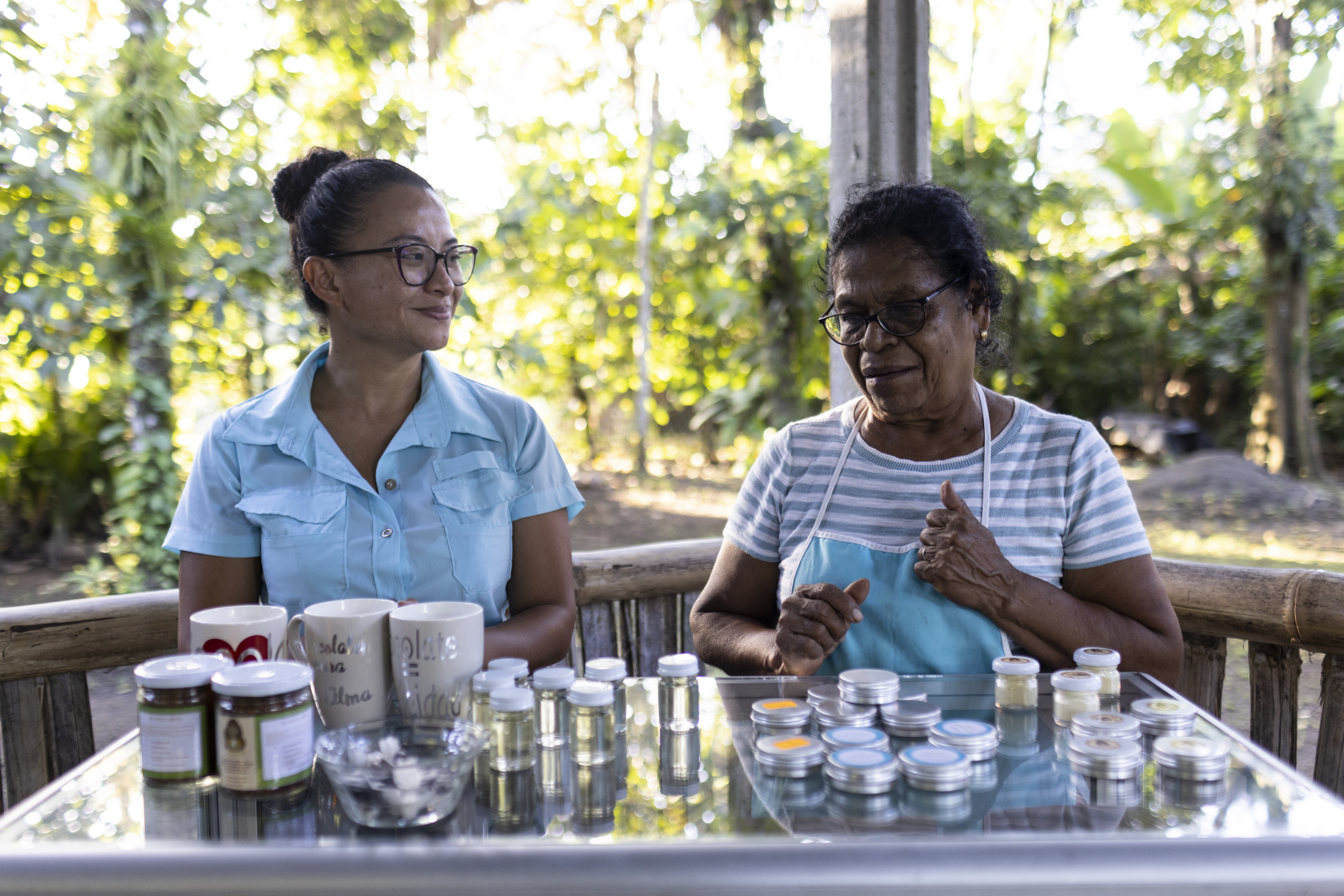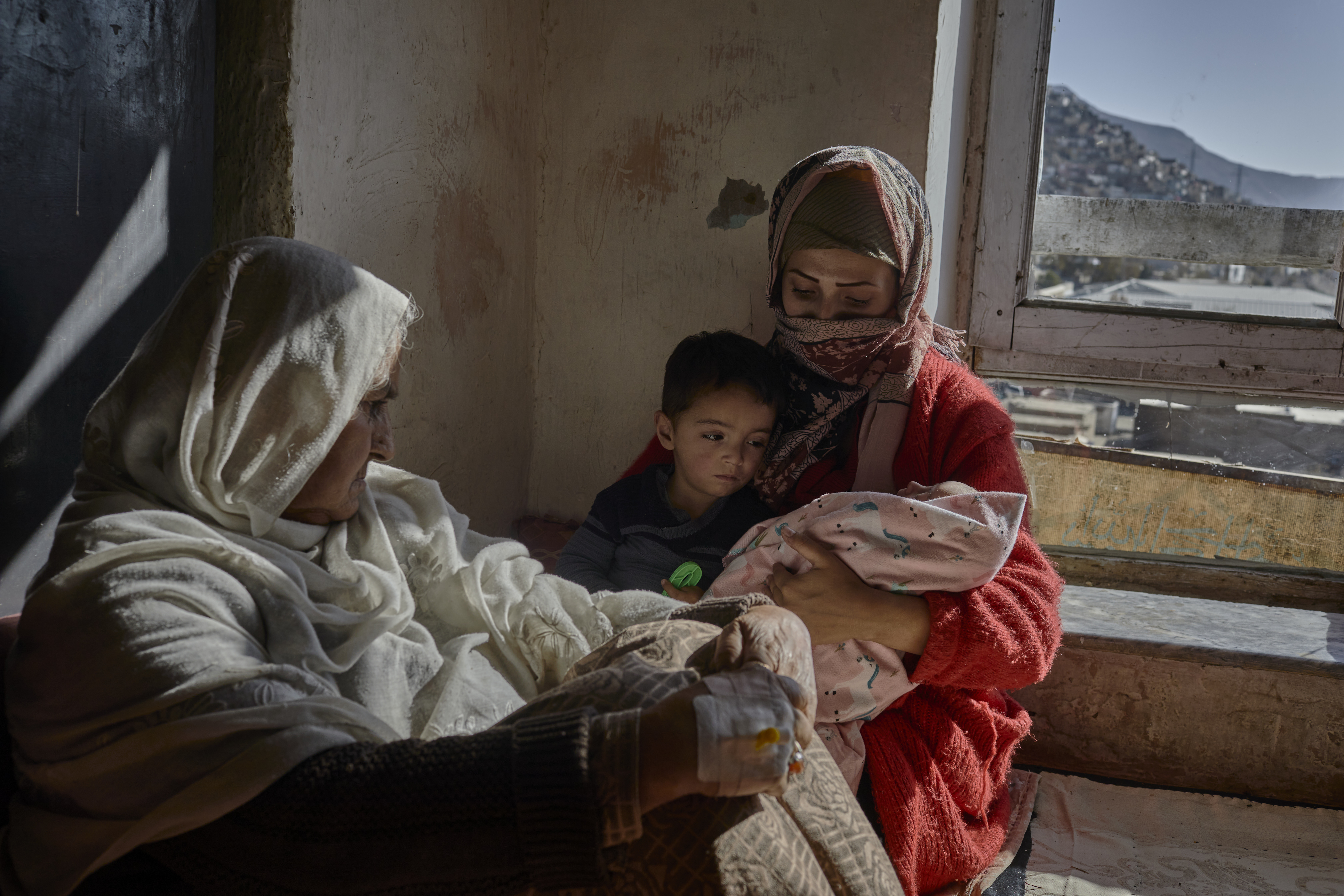UNHCR's top women leaders reflect on gender equity issues on International Women's Day
UNHCR's top women leaders reflect on gender equity issues on International Women's Day

GENEVA, March 8 (UNHCR) - As UNHCR offices worldwide prepared to mark International Women's Day today, the agency's three most senior women recently reflected on gender equity issues affecting staff as well as millions of refugee women and girls.
The theme of this year's International Women's Day is Women in Decision-Making. Three of the top four leadership positions in UNHCR's senior management structure are occupied by women, all of whom are involved in decision-making at the agency's very highest level. High Commissioner António Guterres appointed two of them in January - Assistant High Commissioner for Operations Judy Cheng-Hopkins and Assistant High Commissioner for Protection Erika Feller. Deputy High Commissioner Wendy Chamberlin has held her post-the No. 2 position in UNHCR - since January 2004.
Asked their opinions on efforts by the United Nations in general and UNHCR in particular to give a greater voice to women at the decision-making level, all three said much progress had been made - but there was still a long way to go.
Deputy High Commissioner Wendy Chamberlin: "I think UNHCR particularly, but also the UN in general, is very much focused on gender equity issues," Chamberlin said, adding that she had just returned from a UN High-Level Management Committee meeting in Paris where achieving gender equality and ensuring that women's issues were reflected in each agency's work were major themes. "So I think there is a lot of attention. It is an important issue, and it is a high priority."
Chamberlin said the recent appointments by Guterres of Cheng-Hopkins and Feller reflected his personal, deep commitment to gender.
"He made these appointments and I think it is a testament to his commitment," Chamberlin said. "He's also done a number of other steps, particularly promotions, ensuring that some of the promotions at last are reflecting gender equity ... "
Nevertheless, she added, "there are a number of very serious challenges which are still out there," including the impact of UNHCR's field rotation policy on families - something that no human resource policy will ever be able to fully address.
"There are also the challenges women face with family, with children, with balancing the needs of their own children with their ambitions and their careers," Chamberlin said. "These are personal challenges ... "
"We can't solve all these and we can't totally resolve these kinds of personal choices for women. But what we can do as an organization is to make very clear value judgements when it comes to discrimination against women in the work environment. And I am sorry to say that it still exists. It can be extreme, it can come from abuse and sexual harassment to the other extreme, like men laughing and joking when it comes to female issues."
The millions of displaced women with whom UNHCR works around the world also deserve a chance to make decisions affecting their own lives, Chamberlin said. She noted that all UNHCR field staff must be aware of the needs of refugee women, and that female staff are particularly well-suited to understanding them.
"Many of our beneficiaries are women, and many of their needs by nature mean that they relate better to women staff members," she said. "I don't think we could do our work, I don't think we could protect and assist refugees in the field, without the help of women staff members.
Assistant High Commissioner Judy Cheng-Hopkins says the UN as a whole "falls short" in terms of meeting its gender equity targets, but that Secretary-General Kofi Annan is serious about efforts to improve the situation.
A former UN Development Programme and World Food Programme staff member, Cheng-Hopkins said she believed her nearly three decades of diversified UN experience in both the field and at headquarters contributed to her recent selection as UNHCR's first female Assistant High Commissioner for Operations.
"I would like to think that I was appointed not because I am a woman, but because it was felt that my experience, my background, my academic qualifications, my 27 years with various UN organizations ... have been the main factors ... ," she said. "I would hope that that's the reason. But let's also be realistic about it. On top of that, the fact that I'm a woman and on top of that, a woman from a developing country, maybe did give it the final push."
Even though she believes she was appointed on her own merits, Cheng-Hopkins believes change and diversity can make a good organisation even better.
"What's wrong with stirring the pot a bit? What's wrong with getting a little bit of anxiety amongst the men? What's wrong with that? I think it's all for the good, especially when one is in the process of bringing about change and putting a message out that this is still a very good, solid organization ... "
Ms. Cheng-Hopkins expects to spend much of her time in the field, overseeing UNHCR operations worldwide. She agreed that women leaders may find it more difficult to deal with some male counterparts in conservative societies, but those obstacles can be overcome.
"In Afghanistan, even in the time of the Taliban, I remember having gone there with WFP, there were mullahs and there were mullahs," she recalled. "Some were slightly more progressive and some were just staunchly conservative.... I wouldn't lump all the conservative societies into one. I think that certain ones - and that's where our judgement call comes in - would be perfectly willing to receive a senior woman, to talk serious talk.... Some might be reluctant, but with a little push could - and especially if we prove to be sensible and serious and not meeting their stereotypes ... "
Cheng-Hopkins just returned from her first field mission to Chad and was impressed with the UNHCR staff she met there, including the women managers.
"I have just been in Chad and it's all women," she said. "The representative there is a woman, a tough cookie, as tough as they get. One of her deputies is a woman, in Abéché, right in the middle of this refugee operation in tough, tough conditions. Different style, but as tough as they get - dedicating their entire lives to UNHCR and their jobs. OK, maybe just by coincidence I met two women like that on my first trip. But the fact of the matter is that they are there; so much for this nonsense about women not wanting to go to hardship situations or countries."
Assistant High Commissioner for Protection Erika Feller has headed UNHCR's Department of International Protection since 1999 and believes the agency is now committed to gender equity and is also much more aware of the constraints placed on families.
"I like to think that people get where they get because they have the requisite skills and they have the requisite capacities," said Feller, UNHCR's top lawyer. "I think it is doing a disservice to women as such to suggest that for them to get to this level, the fact that they are women should play an important role ... "
"The challenge of course is to find the right balance, the right work-life balance. That's a challenge for any organization, but a particular challenge in ours where there are so many non-family duty stations. It is not only a challenge for women, it is also a challenge for men because families are split and it can be as traumatic for a male as for a female in the family."
While acknowledging it's something of a generalisation, Feller believes that in field situations, women may have a slightly different attitude to team-building than men, and are prepared to work together within a more harmonious framework.
"I think that in an organisation like UNHCR, which depends a lot on many small teams coming together in hardship locations where people have to depend very much on each other, I think it is very valuable to have that particular skill," she said. "These are the skills of team-building, of working harmoniously and cooperatively rather than hierarchically and antagonistically in a working environment."
Like her two colleagues, Feller also stressed the importance of bringing refugee women into the decision-making process, enabling them to play a more influential role in their camps and communities. UNHCR's Five Commitments to Refugee Women - aimed in part at giving them a greater voice in their daily lives - are part of that process.
"So we have, of course, our five commitments to refugee women, which are by and large respected in many UNHCR operations," she said. "We have training programmes for our own staff, including particularized components focusing very much on how to maximize the participation of women, and how to be sensitive to the contribution that women can make ... and how to be sensitive to the problems that refugee women can have in their communities."
As a successful, professional woman with decades of experience, Feller says she is often asked for advice by younger women just starting their careers. She believes mentoring programmes can be extremely helpful in getting them on the right track.
"One of the things I have always said to any young woman trying to make her way up the ladder is not to fall into the trap of being more man than the man, but remain true to what she is herself," Feller says. "She is a woman, she is a professional woman. She has aspects of her personality and of her capabilities that arise from the fact that she is a woman. She should not try to merge these into a blinkered view that to succeed you have to beat the man at his own game. It is very important to stay true to yourself. And what you are is a person derived from many things, derived from your background, derived from your upbringing, your ethnic origin and from your gender. You should not try to downplay your gender on the false assumption that it is going to be a negative."








